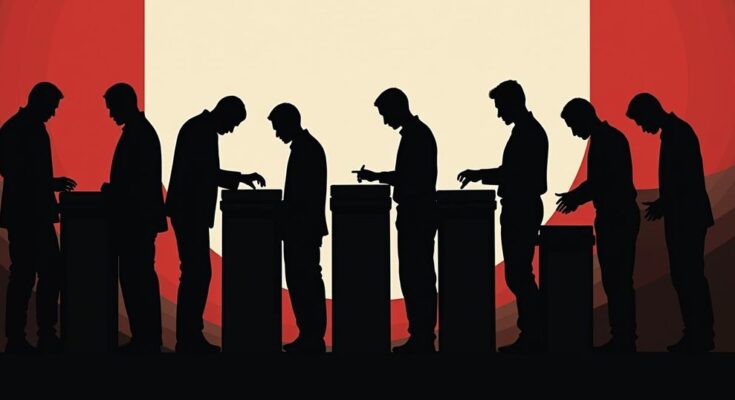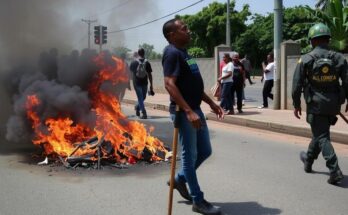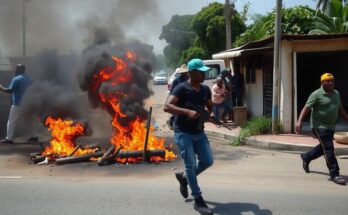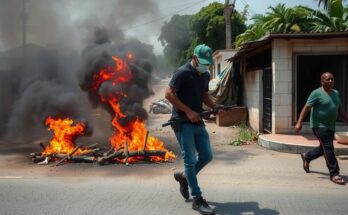Tunisians voted in a presidential election characterized by a lack of serious opposition to incumbent President Kais Saied, whose main rivals are either imprisoned or excluded from the ballot. This election occurs amidst economic difficulties and a backdrop of political instability following the Arab Spring. Critics have described the electoral process as a sham, with many urging a boycott amid rising authoritarianism and political discontent.
Tunisia held its presidential election on Sunday, with limited opposition to President Kais Saied, as many of his most significant challengers remain imprisoned or barred from participating. This election marks the third since the Arab Spring revolts led to profound changes in the political landscape, yet there is a prevailing sense of skepticism regarding whether a legitimate democratic transition will emerge this time. The backdrop to this election is marked by Tunisia’s tumultuous political history following the ousting of long-standing autocrat Zine El Abidine Ben Ali. While initially celebrated as a beacon of democratic success in the Arab world, Tunisia’s progress has stagnated due to economic challenges, political discord, and security issues. President Saied, having first ascended to power in 2019 with promises of reform, now faces scrutiny as many citizens express concerns over the state of their democracy and the increasing authoritarianism apparent in Saied’s governance. The current electoral scenario reflects a limited spectrum of opposition candidates. The election authority approved only three candidates: Saied, Zouhair Maghzaoui, a veteran politician critical of Saied’s policies, and Ayachi Zammel, a businessman mired in legal controversies. Several other potential challengers were prevented from running, including prominent figures like Rached Ghannouchi and Abir Moussi, both of whom have been imprisoned. The absence of serious contenders has led many political factions, including the National Salvation Front, to deem the election process illegitimate and call for a boycott. Moreover, Tunisia’s economic landscape remains dire, with soaring unemployment and dependence on foreign loans exacerbating public discontent. Saied’s administration has struggled with stalled negotiations regarding a significant bailout package from the International Monetary Fund, complicating the nation’s recovery efforts. The election thus serves as both a reflection of the current political climate and the economic struggles facing Tunisia. Many citizens will be evaluating whether they have seen a real shift in political power or merely a continuation of the same regime under Saied’s leadership. With rising migration challenges and increasing xenophobic rhetoric against migrants from sub-Saharan Africa, the socio-political dynamics in Tunisia are particularly complex. Saied’s administration continues to grapple with the balance between internal governance and external expectations, amidst assertions of national sovereignty and partnership agreements with various countries. As the results of this election unfold, it may provide vital insights into the citizenry’s sentiments toward governance, reform, and the future of democracy in Tunisia.
The Tunisian presidential election reflects the country’s complex political journey since the Arab Spring. Following the ousting of Zine El Abidine Ben Ali in 2011, Tunisia transitioned to a democratic system with a new constitution and significant civil society participation. However, economic difficulties and political turmoil have hampered progress. President Kais Saied, a political outsider who won in 2019, introduced changes consolidating his power, which have been met with criticism from democracy advocates. This election is set against a backdrop of a weakened political opposition and ongoing economic strife, which complicate Tunisia’s democracy.
In conclusion, the upcoming presidential election in Tunisia raises significant questions about the future of the nation’s democracy. The lack of viable opposition candidates, combined with economic challenges and a recent history of political repression, casts doubt on Saied’s ability to maintain public support and ensure a truly representative democratic process. As citizens head to the polls, the implications of their choices may define the trajectory of Tunisia’s governance and stability in the years to come.
Original Source: www.euronews.com




